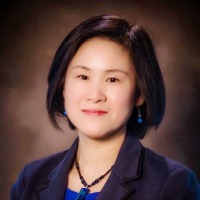
This post was written by Haiying Qian Li, who received a DLF HBCU Fellowship to attend the 2018 Forum.
Haiying Sarah Qian Li has more than 10 years of experiences working with varies digital projects. She is currently the Director of Library Services at Inman E. Page Library of Lincoln University in Missouri.
Mrs. Li first joined the library staff as the Institutional Repository Coordinator in 2014. She helped to build and promote Lincoln University’s digital repository Blue Tiger Commons. In 2016 Mrs. Li received a Digital Imaging Grant to digitize the University Archives’ photographs and documents, which greatly expanded the amount of resources available online about Lincoln University’s history.
Mrs. Li understands deeply the innovations, opportunities and challenges that technology brings to academic libraries today. She is passionate about bringing 21st century library services to the Lincoln University campus and making Page Library the center of teaching, learning, scholarship and dissemination of knowledge.
Having worked many years in the digital library field, I had always wanted to attend the DLF Forum, one of the best conferences of its kind. That is why I was very excited and honored to have been selected as one of the HBCU Fellows to attend this year’s DLF Forum in Las Vegas. At the fellow’s breakfast, I got to meet and experienced a great sense of community with many other DLF fellows, both the young and experienced, all full of energy, excitement, and commitment.
The conference truly amplified the mission of the Digital Library Federation for advancing research, learning, social justice and the public good through the creative design and wise application of digital library technology. The opening speaker Anasuya Sengupta’s talk, “Decolonizing Knowledge, Decolonizing the Internet: an agenda for collective action,” truly set the stage for community action and collaboration from a social justice perspective. We have to think hard about what a “decolonized digital library” looks like. Who defines this vision? Who creates and curates it? What does “success” look like and to whom?
Anasuya’s work focused on helping marginalized communities in India and across the global south, in the US and internationally, to amplify their voices in virtual and physical worlds. One of the panelist’s comments really struck me when she said: “For marginalized communities, if we don’t have unfettered access to history, we cannot fight for our future.” As a woman, as an Asian American who also works at a HBCU (historically black colleges and universities), I feel a strong sense of social responsibility for contributing to a “decolonized internet.” As Anasuya described, a decolonized internet allows us to talk openly, so untold stories can be heard, different faces seen, and a diverse body of ideas protected and amplified. We have to change the internet by making conscious decisions in design and architecture, diversifying the sources of information used and providing ample and inclusive metadata for all audiences. It is everyone’s responsibility, especially those of us who are working in the digital library field and create and curate these types of content.
As Anasuya described, a decolonized internet allows us to talk openly, so untold stories can be heard, different faces seen, and a diverse body of ideas protected and amplified.
I attended many other great sessions on building communities and promoting diversity and inclusion through digital collections, digital scholarship, etc. I was also able to join the Inclusive Metadata Task Force at the working luncheon to start working on providing equitable and inclusive metadata from policy to implementation. It is great to see so many IT professionals working on improving open source platforms, lowering the barriers for smaller institutions to implement too.
As a digital library practitioner and librarian, I plan on taking these ideas back to our daily work spaces and building more equitable and inclusive digital collections. For those who are not working on the cutting edge solutions, contributions can still be made by providing more content types, languages, and ample captions to videos, as well as by including more inclusive metadata for indexing and retrieving. We have to take action, no matter how small it might be. Progress begins with a single step.
Want to know more about the DLF Forum Fellowship Program? Check out last year’s call for applications.
If you’d like to get involved with the scholarship committee for the 2019 Forum (October 13-16, 2019 in Tampa, FL), sign up to join the Planning Committee now! More information about 2019 fellowships will be posted in late spring.
